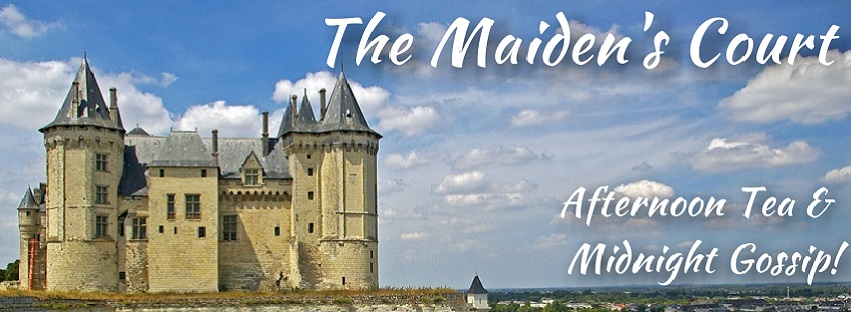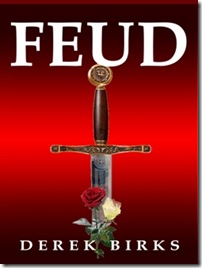Interview #2 this week is with debut author Derek Birks. His novel, Feud, the first in a planned series about a family living through the Wars of the Roses, was released September 30th. Please help me welcome Derek to The Maiden’s Court!
Your novel, Feud, is set during the Wars of the Roses. What attracted you to set your stories in this time period?
It’s a period that’s always appealed to me long before I considered writing historical fiction. I’ve researched it in depth over many years and I feel very comfortable with it, like an old jacket. They always say write about what you know and this is the period I know best.
As for what attracts me to it, it’s a time when politics and warfare are two sides of the same coin and larger than life personalities unashamedly strut their stuff. Law and order is cast aside and local rivalries spawn violent reactions. There is bloodshed and cruelty, discord and misrule but there is also faith, loyalty and courage in bucket loads. The personalities still seize the imagination today – and not just the men, there are some seriously powerful and influential women too. Tudors, eat your heart out!
From what I understand, the main family in your novel, the Elders, is an entirely fictional family. What led you to choose to create a fictional family over a real family? Were there any historical characters that you modeled yours after?
From the start I envisaged a series of books which would potentially span the whole period – in short I needed a dynasty, not just a family! In order to be able to create a succession of storylines I had to be able to plan what my characters would do beyond this first story. By using a fictional family I gave myself a free hand to shape all of their destinies. This meant that, though I was still bound by the events and conventions of the period, the story remained completely within my control.
So, they had to be fictional but, having said that, the Elders and their opponents, the Radcliffes, are typical of many landed families at the time. Family, land ownership and marriages were vital to the long term success, even survival, of such families. When law and order broke down in the 1450s and 1460s some families resorted to force to get what they wanted and in particular to settle old disputes over land. Feud tells the story of a bitter dispute of this kind but it also meshes into the actions of real people.
So many stories have been told about the York’s, Lancaster’s, and the Wars of the Roses – how do you make your story fresh and stand out from others that are out there?
Well, of course one way was by writing about a fictional family because many novels set in the period use actual personalities as their central characters. In my story the “kings and queens” can’t be ignored but they are supporting members of the cast and they don’t drive the action.
Feud is essentially about those caught up in the Wars of the Roses and I’ve tried to create a group of characters on different steps of the social ladder. So, although you have Ned Elder who is a young knight, you also have a good look at those who serve him, for better or worse. Several characters from what you might call the ‘serving’ classes play pivotal roles in the story and the ways in which they interact with the Elders try to give some depth and realism to the narrative.
Feud is not simply the tale of a brutal struggle, it’s also a love story – in fact several love stories. There are many more female characters than you might find in a fifteenth century story with so much action in it. I was keen to demonstrate that some women in the late fifteenth century did have opportunities for independence and I think this plays well with modern readers as quite a number who have read the book have told me how pleasantly surprised they were about the variety of female roles.
I read on your website that you like to read medieval historical fiction and are drawn to Bernard Cornwell. He is a favorite author of mine too. What is it about medieval fiction that you enjoy reading about?
Reading for me is often escapism, so I suppose at a basic level the medieval period is far enough away from modern times to seem like a different world. It’s still shrouded in a little mystery: beliefs, social conventions and institutions are very different from today. It’s a more brutal, elemental society but you can still find the virtues of industry, loyalty and bravery.
It’s a time that interests me but I don’t admire it or envy the people who lived through it because the lives of ordinary folk didn’t amount to much. For everyone except the very wealthy surviving each year was worthy of a big celebration in itself for the means of life and death were always close at hand.
Medieval stories I like are those where survival balances on a knife’s edge – sometimes literally. I like stories about people carrying on despite the terrible burdens placed upon them by those that wield power in church and state. So I want to read about people in the Middle Ages who fight back - everyone loves a rebel!
When you are not writing or reading, what do you enjoy doing for fun?
Well, I’m a sucker for films and will watch virtually anything! But sometimes you’ve got to get up out of the armchair, so I also do a lot of walking and swimming. I like to travel, especially to visit historical sites – almost any site! In the past year I’ve taken up archaeology and spent a lot of time digging at a Roman villa. Despite being on my knees all the time, I’ve really enjoyed this and as a complete amateur I’ve been shown much tolerance by the old hands:
Me: “Hey, this looks like a highly polished decorative stone - part of some jewelry?”
Old hand: “No, that just your average bit of rock…”
But I’ve learned a lot in a short time, so I intend to keep going with that.
You indicated that Feud is only the first of a series of books. Can you tell us anything about what you have planned?
The next book, a sequel to Feud, is already well under way. Feud ends in 1461 and the second book misses out a few years to move the story on to 1464. It’s set in the far north of England where the deposed Lancastrian King, Henry VI, is trying to muster support to regain his throne. Again it’s rooted in the events of the Wars of the Roses and it follows the fortunes – or misfortunes - of the Elders who are in trouble again!
Beyond that I have already roughed out several more books in the series, but we’ll see how it goes. I find the characters have lives of their own and sometimes even I don’t know what they’ll do next!
Derek was born in Hampshire, England but his family emigrated to New Zealand and he spent his teenage years in Auckland. Having returned to England he studied History at Reading University and then taught history at a secondary school for many years before taking early retirement to concentrate on his writing. He now lives in Berkshire with his family.
You can find Derek at the following sites:
|
Copyright © 2012 by The Maiden’s Court



 FEUD: Derek Birks: Kindle Store
FEUD: Derek Birks: Kindle Store
Great interview! This sounds like a book I would enjoy vey much.
ReplyDelete